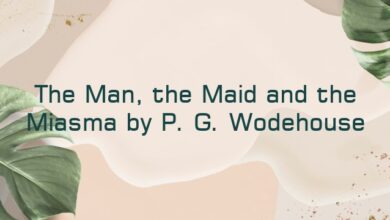
Catching the Train by Arnold Bennett
I
Arthur Cotterill awoke. It was not exactly with a start that he awoke, but rather with a swift premonition of woe and disaster. The strong, bright glare from the patent incandescent street lamp outside, which the lavish Corporation of Bursley kept burning at the full till long after dawn in winter, illuminated the room (through the green blind) almost as well as it illuminated Trafalgar Road. He clearly distinguished every line of the form of his brother Simeon, fast and double-locked in sleep in the next bed. He saw also the open trunk by the dressing-table in front of the window. Then he looked at the clock on the mantelpiece, the silent witness of the hours. And a pair of pincers seemed to clutch his heart, and an anvil to drop on his stomach and rest heavily there, producing an awful nausea. Why had he not looked at the clock before? Was it possible that he had been awake even five seconds without looking at the clock–the clock upon which it seemed that his very life, more than his life, depended? The clock showed ten minutes to seven, and the train went at ten minutes past. And it was quite ten minutes’ walk to the station, and he had to dress, and button those new boots, and finish packing–and the porter from the station was late in coming for the trunk! But perhaps the porter had already been; perhaps he had rung and rung, and gone away in despair of making himself heard (for Mrs Hopkins slept at the back of the house).
Something had to be done. Yet what could he do with those hard pincers pinching his soft, yielding heart, and that terrible anvil pressing on his stomach? He might even now, by omitting all but the stern necessities of his toilet, and by abandoning the trunk and his brother, just catch the train, the indispensable train. But somehow he could not move. Yet he was indubitably awake.
“Simeon!” he cried at length, and sat up.
The younger Cotterill did not stir.
“Sim!” he cried again, and, leaning over, shook the bed.
“What’s up?” Simeon demanded, broad awake in a second, and, as usual, calm, imperturbable.
“We’ve missed the train! It’s ten–eight–minutes to seven,” said Arthur, in a voice which combined reproach and terror. And he sprang out of bed and began with hysteric fury to sort out his garments.
Simeon turned slowly on his side and drew a watch from under his pillow. Putting it close to his face, Simeon could just read the dial.
“It’s all right,” he said. “Still, you’d better get up. It’s eight minutes to six. We’ve got an hour and eighteen minutes.”
“What do you mean? That clock was right last night.”
“Yes. But I altered it.”
“When?”
“After you got into bed.”
“I never saw you.”
“No. But I altered it.”
“Why?”
“To be on the safe side.”
“Why didn’t you tell me?”
“If I’d told you, I might just as well have not altered it. The man who puts a clock on and then goes gabbling all over the house about what he has done is an ass; in fact, to call him an ass is to flatter him.”
Arthur tried to be angry.
“That’s all very well–” he began to grumble.
But he could not be angry. The pincers and the anvil had suddenly ceased their torment. He was free. He was not a disgraced man. He would catch the train easily. All would be well. All would be as the practical Simeon had arranged that it should be. And in advancing the clock Simeon had acted for the best. Of course, it was safer to be on the safe side! In an affair such as that in which he was engaged, he felt, and he honestly admitted to himself, that he would have been nowhere without Simeon.
“Light the stove first, man,” Simeon enjoined him. “There’s been a change in the weather, I bet. It’s as cold as the very deuce.”
Yes, it was very cold. Arthur now noticed the cold. Strange–or rather not strange–that he had not noticed it before! He lit the gas stove, which exploded with its usual disconcerting plop, and a marvellously agreeable warmth began to charm his senses. He continued his dressing as near as possible to the source of this exquisite warmth. Then Simeon, in his leisurely manner, arose out of bed without a word, put his feet into slippers and lit the gas.
“I never thought of that,” said Arthur, laughing nervously.
“Shows what a state you’re in,” said Simeon.
Simeon went to the window and peeped out into the silence of Trafalgar Road.
“Slight mist,” he observed.
Arthur felt a faint return of the pincers and anvil.
“But it will clear off,” Simeon added.
Then Simeon put on a dressing-gown and padded out of the room, and Arthur heard him knock at another door and call:
“Mrs Hopkins, Mrs Hopkins!” And then the sound of a door opening.
“She was dressed and just going downstairs,” said Simeon when he returned to their bedroom. “Breakfast ready in ten minutes. She set the table last night. I told her to.”
“Good!” Arthur murmured.
At sixteen minutes past six they were both dressed, and Simeon was showing Arthur that Simeon alone knew how to pack a trunk. At twenty minutes past six the trunk was packed, locked and strapped.
“What about getting the confounded thing downstairs?” Arthur asked.
“When the porter comes,” said Simeon, “he and I will do that. It’s too heavy for you to handle.”
At six twenty-one they were having breakfast in the little dining-room, by the heat of another gas-stove. And Arthur felt that all was well, and that in postponing their departure till that morning in order not to upset the immemorial Christmas dinner of their Aunt Sarah, they had done rightly. At half-past six they had, between them, drunk five cups of tea and eaten four eggs, four slices of bacon, and about a pound and a half of bread. Simeon, with what was surely an exaggeration of imperturbability, charged his pipe, and began to smoke. They had forty minutes in which to catch the Loop-Line train, even if it was prompt. There would then be forty minutes to wait at Knype for the London express, which arrived at Euston considerably before noon. After which there would be a clear ninety minutes before the business itself–and less than a quarter of a mile to walk! Yes, there was a rich and generous margin for all conceivable delays and accidents.
“The porter ought to be coming,” said Simeon. It was twenty minutes to seven, and he was brushing his hat.
Now such a remark from that personification of calm, that living denial of worry, Simeon, was decidedly unsettling to Arthur. By chance, Mrs Hopkins came into the room just then to assure herself that the young men whose house she kept desired nothing.
“Mrs Hopkins,” Simeon asked, “you didn’t forget to call at the station last night?”
“Oh no, Mr Simeon,” said she; “I saw the second porter, Merrith. He knows me. At least, I know his mother–known her forty year–and he promised me he wouldn’t forget. Besides, he never has forgot, has he? I told him particular to bring his barrow.”
It was true the porter never had forgotten! And many times had he transported Simeon’s luggage to Bleakridge Station. Simeon did a good deal of commercial travelling for the firm of A. & S. Cotterill, teapot makers, Bursley. In many commercial hotels he was familiarly known as Teapot Cotterill.
The brothers were reassured by Mrs Hopkins. There was half an hour to the time of the train–and the station only ten minutes off. Then the chiming clock in the hall struck the third quarter.
“That clock right?” Arthur nervously inquired, assuming his overcoat.
“It’s a minute late,” said Simeon, assuming his overcoat.
And at that word “late,” the pincers and the anvil revisited Arthur. Even the confidence of Mrs Hopkins in the porter was shaken. Arthur looked at Simeon, depending on him. It was imperative that they should catch the train, and it was imperative that the trunk should catch the train. Everything depended on a porter. Arthur felt that all his future career, his happiness, his honour, his life depended on a porter. And, after all, even porters at a pound a week are human. Therefore, Arthur looked at Simeon.
Simeon walked through the kitchen into the backyard. In a shed there an old barrow was lying. He drew out the barrow, and ticklishly wheeled it into the house, as far as the foot of the stairs.
“Mrs Hopkins,” he called. “And you too!” he glanced at Arthur.
“What are you going to do?” Arthur demanded.
“Wheel the trunk to the station myself, of course,” Simeon replied. “If we meet the porter on the way, so much the better for us … and so much the worse for him!” he added.
II
It was just as dark as though it had been midnight–dark and excessively cold; not a ray of hope in the sky; not a sign of life in the street. All Bursley, and, indeed, all the Five Towns, were sleeping off the various consequences of Christmas on the human frame. Trafalgar Road, with its double row of lamps, each exactly like that one in front of the house of the Cotterills, stretched downwards into the dead heart of Bursley, and upwards over the brow of the hill into space. And although Arthur Cotterill knew Trafalgar Road as well as Mrs Hopkins knew the hundred and twenty-first Psalm, the effect of the scene on him was most uncanny. He watched Simeon persuade the loaded barrow down the step into the tiny front garden, not daring to help him, because Simeon did not like to be helped by clumsy people in delicate operations. Mrs Hopkins was rapidly pouring all the goodness of her soul into his ear, when Simeon and the barrow reached the pavement, and Simeon staggered and recovered himself.
“Look out, Arthur,” Simeon cried. “The road’s like glass. It’s rained in the night, and now it’s freezing. Come along.”
Arthur bade adieu to Mrs Hopkins.
“Eh, Mr Arthur,” said she. “Things’ll be different when ye come back, this time a month.”
He said nothing. The pincers and the anvil were at him again. He thought of falls, torn garments, broken legs.
Simeon lifted the arms of the barrow, and then dropped them.
“Have you got it?” he demanded of Arthur.
“Got what?”
“It.”
“Yes,” said Arthur, comprehending.
“Are you sure? Show it me. Better give it me. It will be safer with me.”
Arthur unbuttoned his overcoat, took off his left glove, and drew from one of his pockets a small, bright object, which shone under the street lamp. Simeon took it silently. Then he definitely seized the arms of the barrow, and the procession started up the street.
No time had been lost, for Simeon had an extraordinary gift of celerity. It was eleven minutes to seven. Nevertheless, Arthur felt the pincers, and the feel of the pincers made him look at his watch.
“See here,” said Simeon, briefly. “You needn’t worry. We shall catch that train. We’ve got twenty minutes, and we shall get to the station in nine.” The exertion of wheeling the barrow over what was practically a sheet of rough ice made him speak in short gasps.
Impossible for the pincers and the anvil to remain in face of that assured, almost god-like tone!
“Good!” murmured Arthur. “By Jove, but it’s cold though!”
“I’ve never been hotter in my life,” said Simeon, puffing. “Except in my hands.”
“Can’t I take it for a bit?”
“No, you can’t,” said Simeon. At the robust finality of the refusal Arthur laughed. Then Simeon laughed. The party became gay. The pincers and the anvil were gone for ever. Simeon turned gingerly into Pollard Street-half-way to the station. They had but to descend Pollard Street and climb the path across the cinder-heaps beyond, and they would be, as it were, in harbour. In Pollard Street Simeon had the happy idea of taking to the roadway. It was rougher, and, therefore, less dangerous, than the pavement. At intervals he shoved the wheel of the barrow by main force over a stone.
“Put my hat straight, will you?” he asked of Arthur, and Arthur obeyed. It was becoming a task under the winter stars.
Then Arthur happened to notice the wheel of the barrow–its sole wheel.
“I say,” he said, “what’s up with that wheel?”
“It’s rocky, that’s what that wheel is,” replied Simeon. “I hope it will hold out.”
Instead of pushing the barrow he was now holding it back, down the slant of Pollard Street. The mist had cleared. And Arthur could see the red gleam of a signal in the neighbourhood of the station. But now the pincers and the anvil were at him again, for Simeon’s tone was alarming. It indicated that the wobbling wheel of the barrow might not hold out.
The catastrophe happened when they were climbing the cinder-slope and within two hundred yards of the little station. Simeon was propelling with all his might, and he propelled the wheel against half a brick. The wheel collapsed. There was a splintering even of the main timbers of the vehicle as the immense weight of the trunk crashed to the solid earth.
Simeon fell, and rose with difficulty, standing on one leg, and terribly grimacing.
He said nothing, but consulted his watch by the aid of a fusee.
“We must carry it,” Arthur suggested wildly.
“We can’t carry it up here. It’s much too heavy.”
Arthur remembered the tremendous weight of even his share of it as they had slid it down the stairs.
No. It could not be carried.
“Besides,” said Simeon, “I’ve sprained my ankle, I fear.” And he sat down on the trunk.
“What are we to do?” Arthur asked tragically.
“Do? Why, it’s perfectly simple! You must go without me. Anyhow, run to the station, and try to get the porter down here with another barrow.”
Man of infinite calm, of infinite resource. Though the pincers and the anvil were horribly torturing him at that moment, Arthur could not but admire his younger brother’s astounding sangfroid.
And he set off.
“Here!” Simeon called him peremptorily. “Take this–in case you don’t come back.”
And he handed him the small bright object.
“But I must come back. I can’t possibly go without the trunk. All my things are in it.”
“I know that, man. But perhaps you’ll have to go without it. Hurry!”
Arthur ran. He encountered the senior porter at the gate of the station.
“Where’s Merrith?” he began. “He was to have–“
“Merrith’s mother is dead–died at five o’clock,” said the senior porter. “And I’m here all alone.”
Arthur stopped as if shot.
“Well,” he recovered himself. “Lend me a barrow.”
“I shall lend ye no barrow. It’s against the rules. Since they transferred our stationmaster to Clegg there’s been an inspector down here welly [well nigh] every day.”
“But I must have a barrow.”
“I shall lend ye no barrow,” said the senior porter, a brute.
A signal close to the signal-box clattered down from red to green.
“Her’s signalled,” said the senior porter. “Are ye travelling by her?”
Arthur had to decide in a moment. Must he or must he not abandon Simeon and the trunk? The train, a procession of lights, could be seen in the distance under the black sky. He gave one glance in the direction of Simeon and the trunk, and then entered the station.
Simeon had been right. He did catch the train.
It was fortunate that there was a wide margin between the advertised time of arrival of the Loop-Line train at Knype and the departure therefrom of the London express. For, beyond Hanbridge, the Loop-Line train came to a standstill, and obstinately remained at a standstill for near upon forty minutes. Dawn began and completed itself while that train reposed there. Things got to such a point that, despite the intense cold, the few passengers stuck their heads out of the windows and kept them there. Arthur suffered unspeakably. He imparted his awful anxiety to an old man in the same compartment. And the old man said:
“They always keep the express waiting for the Loop. Moreover, you’ve plenty o’ time yet.”
He knew that the Loop was supposed to catch the express, and that in actual practice it did catch it. He knew that there was yet enough time. Still, he continued to suffer. He continued to believe, at the bottom of his heart, that on this morning, of all mornings, the Loop would not catch the express.
However, he was wrong. The Loop caught the express, though it was a nearish thing. He dashed down into the subterranean passage at Knype Station, reappeared on the up-platform, ran to the fore-part of the express, which was in and waiting, and jumped; a porter banged the door, a guard inspired the driver by a tune on a whistle, and off went the express. Arthur was now safe. Nothing ever happened to a North-Western express. He was safe. He was shorn of his luggage (almost, but not quite, indispensable) and of Simeon; but he was safe. He could not be disgraced in the world’s eye. He thought of poor, gallant, imperturbable, sprained Simeon freezing on the trunk in the middle of the cinder-waste.
III
The train stopped momentarily at a station which he thought to be Lichfield. Then (out of his waking dreams) it seemed to him that Lichfield Station had strangely grown in length, and just as the train was drawing out he saw the word “Stafford” in immense white enamelled letters on a blue ground. There was nobody else in the compartment. His heart and stomach in a state of frightful torture, he sprang out of it–not on to the line, but into the corridor (for it was a corridor train) and into the next compartment, where were seated two men.
“Is this the London train?” he demanded, not concealing his terror.
“No, it isn’t. It’s the Birmingham train,” said one of the men fiercely–a sort of a Levite.
“Great heavens!” ejaculated Arthur Cotterill.
“You ought to inquire before you get into a train,” said the Levite.
“The fact is,” said the other man, who was perhaps a cousin of a Good Samaritan, “the express from Manchester is split up at Knype–one part for London, and the other part for Birmingham.”
“I know that,” said Arthur Cotterill.
“Ever since I can remember the London part has gone off first.”
“Of course,” said Arthur; “I’ve travelled by it lots of times.”
“But they altered it only last week.”
“I only just caught the train,” Arthur breathed.
“Seems to me you didn’t catch it,” said the Levite.
“I must be in London before two o’clock,” said Arthur, and he said it so solemnly, he said it with so much of his immortal soul, that even the Levite was startled out of his callous indifference.
“There are expresses from Birmingham to London that do the journey in two hours,” said he.
“Let us see,” said the cousin of a Good Samaritan, kindly, opening a bag and producing Bradshaw.
And he explained to Arthur that the train reached New Street, Birmingham, at 10.45, and that, by a singular good fortune, a very fast express left New Street at 11.40, and arrived at Euston at 1.45.
Arthur thanked him and retired with his pincers and anvil to his own compartment.
He was a ruined man, a disgraced man. The loss of his trunk was now nothing. At the best he would be over half an hour late, and it was quite probable that he would be too late altogether. He pictured the other people waiting, waiting for him anxiously, as minute after minute passed, until the fatal hour struck. The whole affair was unthinkable. Simeon’s fault, of course. Simeon had convinced him that to go up to London on Christmas Day would be absurd, whereas it was now evident that to go up to London on Christmas Day was obviously the only prudent thing to do. Awful!
The train to Birmingham was in an ironical mood, for it ran into New Street to the very minute of the time-table. Thus Arthur had fifty-five futile minutes to pass. At another time New Street, as the largest single station in the British Empire, might have interested him. But now it was no more interesting than Purgatory when you know where you are ultimately going to. He sought out the telegraph-office, and telegraphed to London–despairing, yet a manly telegram. Then he sought out the refreshment-room, and ordered a whisky. He was just putting the whisky to his lips when he remembered that if, after all, he did arrive in time, the whisky would amount to a serious breach of manners. So he put the glass down untasted, and the barmaid justifiably felt herself to have been insulted.
He watched the slow formation of the Birmingham-London express. He also watched the various clocks. For whole hours the fingers of the clocks never budged, and even then they would show an advance of only a minute or two.
“Is this the train for London?” he asked an inspector at 11.35.
“Can’t you see?” said the inspector, brightly. As a fact, “Euston” was written all over the train. But Arthur wanted to be sure this time.
The express departed from Birmingham with the nicest exactitude, and covered itself with glory as far as Watford, when it ran into a mist, and lost more than a quarter of an hour, besides ruining Arthur’s career.
Arthur arrived in London at one minute past two. He got out of the train with no plan. The one feasible enterprise seemed to be that of suicide.
“Come on, now,” said a voice–a voice that staggered Arthur. It was a man with a crutch who spoke. It was Simeon. “Come on, quick, and don’t talk too much! To the hotel first.” Simeon hobbled forward rapidly, and somehow (he could not explain how) the anvil and pincers had left Arthur.
“I got hold of a milk-cart with a sharpened horse, and drove to Knype. Horse fell once, but he picked himself up again. Cost me a sovereign. Only just caught the train. Shouldn’t have caught it if they hadn’t sent off the Birmingham part before the London part. I was astonished, I can tell you, not to find you at Euston. Went to the hotel. Found ‘em all waiting, of course, and practically weeping over a telegram from you. However, I soon arranged things. Had to buy a crutch…. Here, boy, lift!” They were in the hotel.
On a bed all Arthur’s finest clothes were laid out. The famous trunk was at the foot of the bed.
“Quick!”
“But look here!” Arthur remonstrated. “It’s after two now.”
“Well, if it is? We’ve got till three. I’ve arranged with the mandarin chap for a quarter to three.”
“I thought these things couldn’t occur after two o’clock–by law.”
“That’s what’s the matter with you,” said Simeon; “you think too much. The two o’clock law was altered years ago. Had anything to eat?” He was helping Arthur with buttons.
“No.”
“I expected not. Here! Swallow this whisky.”
“Not I!” Arthur protested in a startled tone.
“Why not?”
“Because I shall have to kiss her after the ceremony.”
“Bosh!” said Simeon. “Drink it. Besides, there’s no kissing in a Registry Office. You’re thinking of a church. I wish you wouldn’t think so much. Here! Now the necktie, you cuckoo!”
In three minutes they were driving rapidly through the London mist towards the other sex, and in a quarter of an hour there was one bachelor the less in this vale of tears.





